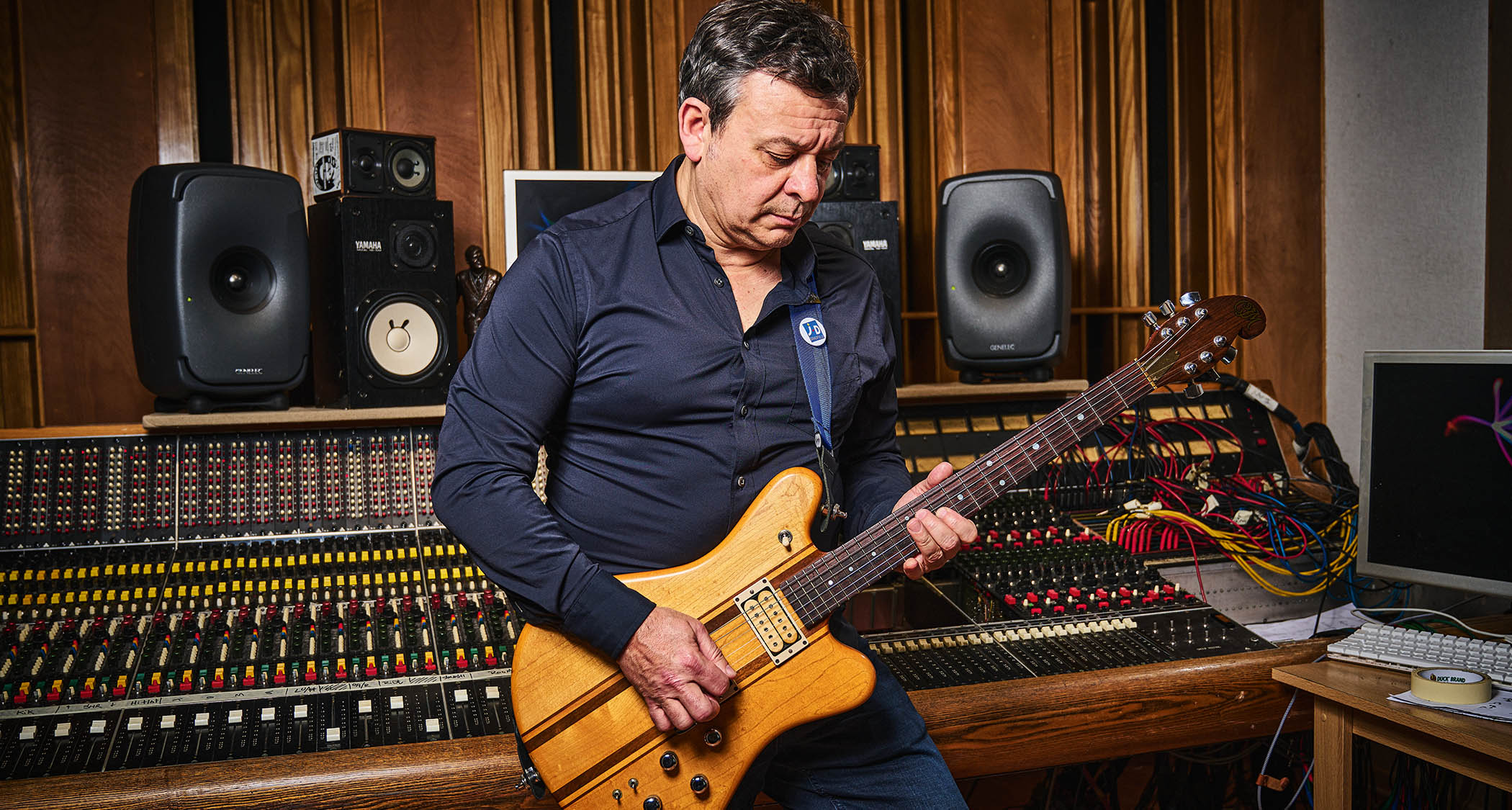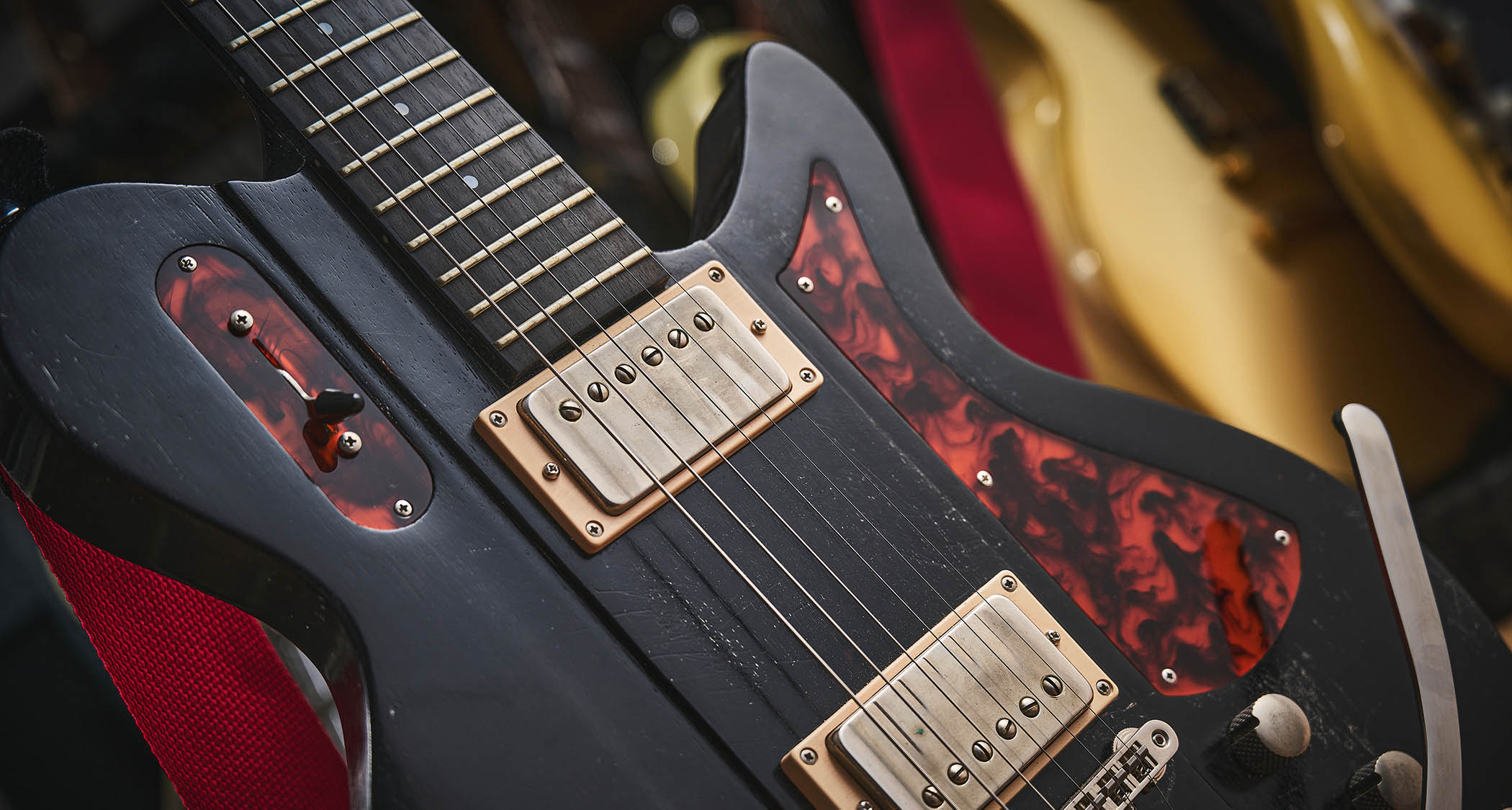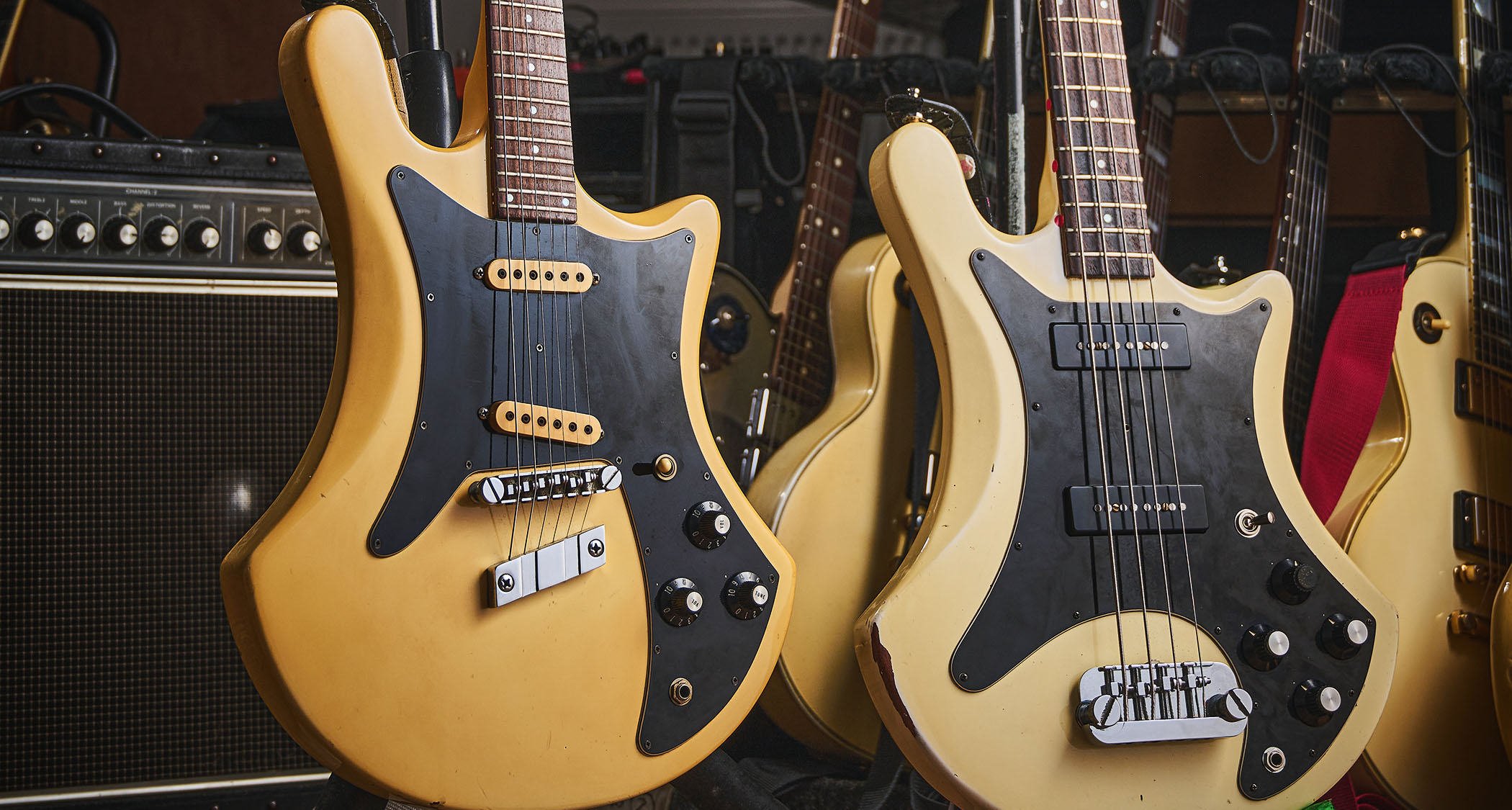“We go and look in the garage – it was there. It hadn’t been looked at for 20 years and was sad and falling apart. It was like, ‘Help me!’” James Dean Bradfield on unearthing his rare “birthright” guitar, gear epiphanies and why Robert Smith is underrated
Manic Street Preachers' new album, Critical Thinking, had Bradfield reconnecting with guitars new and old, Nicky Wire unleashing on the title track, and it is a typically unique work from the Welsh rock institution

It’s a characteristic of the best bands that they are loved by millions but also completely unique. It’s a trick that Manic Street Preachers have pulled off for years, from the angular, agit-rock of The Holy Bible to the beauty and tragedy of their breakthrough 1996 album, Everything Must Go, recorded in the wake of lyricist and rhythm guitarist Richey Edwards’ disappearance, their sound is instantly recognisable and wholly their own.
Today, with the release of their 15th album, Critical Thinking, that vital spark of originality and vivid honesty is undimmed – even if the band do the shopping on the way home from sessions these days, following the establishment of a permanent studio near their homes in South Wales.
We join guitarist James Dean Bradfield at the studio, to hear how Critical Thinking was made on classic foundations: with James, bassist Nicky Wire and drummer Sean Moore feeling their way through material, jamming and experimenting – allowing the best ideas to rise to the surface.
We also have a close look at an eclectic and stunning-sounding selection of James’s guitars that call the studio home.
The new record took shape right here, didn’t it?
“Yeah. The way we work now is just different. Like, back in the day, up until, I’d say, Send Away The Tigers, you’d do some rough demos. I’d do acoustic demos, Nick would do a little acoustic demo. We would just actually go around each other’s houses, play to each other.
“But usually, we’d just give each other acoustic cassettes and then we’d hire a rehearsal room [to complete the songs before recording them] and we did it that way until Send Away The Tigers. Then we got our own studio.
Get The Pick Newsletter
All the latest guitar news, interviews, lessons, reviews, deals and more, direct to your inbox!
“Starting an album would be a gradual process after that – previously, you’d book a studio and you’d do an album in four or five weeks. But ever since Send Away The Tigers, every album has started with a gradual process of doing the demos in our own studio. Sometimes the demos have become the masters and sometimes you’ve got all the demos, but you do the mastering in the same place that you did the demos.”
“All the lines are blurred, in terms of where the demos end and where just recording the album begins. It’s been like that since about 2007. So I’d say one of the oldest songs on this new album is two and a half years old.
“We did do two weeks in Rockfield Studios for some finishing sessions, but most of the recording on the album is myself, Nick and Sean coming in [to our studio] at 10am, and then clocking off at 5pm to go home and have tea with the family. Sometimes I’d come back at night, when you’re really going at it.”
Having your own studio has clearly given you the freedom to work at your own pace, but it’s interesting that you still used Rockfield to give a little extra kick to the final stages of the recording process. Do you think that working in a particular space imparts a unique energy to what gets recorded there?
“Well, The Holy Bible was recorded in a gritty little studio in Cardiff [Soundspace Studios]. That did rub off on it a bit, definitely.
“Because you’d go out late at night, two o’clock in the morning, and a pimp would be collecting money in the courtyard where the studio was, where you’d walk out the door at 3 o’clock in the afternoon and somebody would be sniffing glue.
“It did rub off on the gnarliness of The Holy Bible. But that may have been there already – I might be romanticising it. I think it was more important how we recorded it in a very sparing way. So, location, I’m not sure if it ever affects it.”

Do you tend to write with a specific album concept in mind? Or do you just keep writing songs with an open mind until the shape of an album emerges?
“It’s strange. I think with The Ultra Vivid Lament, everyone was coming out of the pandemic and, God, it was quite strange. It felt like a very confusing political time – look where we are now. It just gets worse and worse.
“But Nick was trying to create a window where [listeners] could almost intrusively look into the way we were thinking and just actually hope that it would reflect the way other people felt, too, because we’d all been through this thing. There was an MO to it.
“A lot of times, [when starting a new recording project] Nick will give me and Sean a mission statement. And back in the day, Nick and Richey would have a mission statement about what they thought the album should be, whether it be The Holy Bible or whatever. You’d have a loose framework – dare I say a concept – to hang a record off. It’s harder doing that, I think.”

“Now, we tend to coalesce around stuff that we find we want to play more than three or four times in a row when we’re doing early versions of it. I think that’s enough of a reason for an album sometimes. So this album has been like that: if a song refused to go away, we carried on working on it. As simple as that.
“Decline and Fall was an early song, People Ruin Paintings was an early song, Dear Stephen was an early song. This is really silly, but years ago there were certain albums that I had on cassette first because it was cheaper, but then when I went and bought them on CD or vinyl, they weren’t as good [laughs].
“I know that’s such a nebulous thing to try to describe, but some of my favourite ‘cassette albums’ were In My Tribe by 10,000 Maniacs, Fables Of The Reconstruction by REM, and London Calling on cassette – never sounded as good on vinyl. I’m sorry, but they just didn’t. This Nation’s Saving Grace by The Fall is fucking amazing on tape, absolutely amazing. That little bit of compression on tape made it feel more personal somehow.”

“So after we’d made demos of those three songs, I thought, ‘This feels like a cassette album.’ Then I’m thinking, ‘Don’t be such a dick’ [laughs]. But that feeling has never gone away. It feels like a cassette album, it does. I like that. It’s nice.”
Critical Thinking is like Nicky Wire’s Falling Down moment – without the guns. I thought, ‘The guitar has got to be like a small lieutenant: it’s got to be snapping at the heels of everything he says’
Tell us about the title track, Critical Thinking – it’s a straight-for-the-jugular song about society losing its way in the era of social media.
“That’s another one of Nick’s songs. He brought all the music, and I just had to be the guitarist and come up with the parts. The demo of it was just bits of programming and Nick’s vocal and a bass. But I thought, ‘Oh, God. The words are brilliant.’ It’s like Nicky Wire’s Falling Down moment – without the guns. I thought, ‘The guitar has got to be like a small lieutenant: it’s got to be snapping at the heels of everything he says.’
“So I did a ‘white funk’ guitar kind of thing and I used the Guild. It was the only guitar that worked on it – I loved playing that. I loved just being the guitarist and just finding my own space, and having to find different things within four chords or even three chords [laughs]. I love doing that.”
Your sound has a touch of chorus on it and it kind of reminded us of Geordie Walker from Killing Joke in places.
“Yeah, Geordie… God. I remember somebody telling me once that his guitar sound was two Burman amps out of phase to each other. I did use one of my Burmans on a couple of tracks. But they just burn – they just go up in flames! I took them out on the road and there’d be fucking flames coming out of back [laughs]! But three gain stages. You can’t turn that down.”
Did you use a particular chorus pedal for the album?
“I use the Electro-Harmonix Neo Clone and the Fender [Hammertone] Space Delay. That particular delay pedal has got modulation on it, too, and it’s brilliant. Live, if I’m struggling – if it feels like the guitar is not flying – I just put that on and it’s great. Who cares if there was no modulation on the studio version of the song; there is now [laughs].
“I gave one to Richard [Oakes] from Suede when we toured with them. I had a spare one and I gave it to him… I said, ‘Just try this pedal – but be careful. Once you buy it, you’ll want to put it on everything.’ So there was a bit of that [on Critical Thinking] – it was just a bit of modulation from the Fender Space Delay. They’re really good, those pedals. They’re so simple because there’s not too much on them.
“I do use a hint of [pure] chorus on stuff sometimes, especially when playing clean and when playing live. But often, I’ll have the chorus set at the lowest possible setting, so it gives it a little bit of spread, just like Robert Smith used to use it. Rob Smith is a really underrated guitarist.
“There’s footage of him on Belgium TV doing the live version of A Forest from the mid-’80s and it’s fucking amazing. So many guitarists – like Stuart Adamson, Robert Smith, John McGeoch – they all used quite sneaky, surreptitious bits of chorus and that kind of thing. Obviously, Bill Nelson as well. Loads of those guitarists I loved.”
What were your go-to guitars and amps on the record?
“My 1990 Les Paul Custom – my ‘Faithful’ – runs through the record, and it averages every other track: it’s the main guitar on Decline and Fall as well. Richey’s old Telecaster Thinline always finds some places on each record. Since the start, those two guitars have been on every album, just about.
“But on this album, it’s the Guild S60-D. Basically, I found that guitar halfway through the record, and then I started putting it on everything, even if it was just a little tiny bit. It was our soundman [Robb Allan]’s guitar and it used to live in Maida Vale. I’ve stayed friends with him, and he’s Massive Attack’s soundman now.”

“He finished sound with us around about 2001. Anyway, when he first became our soundman, he saw us in Camden Underworld on the ‘Motown Junk’ tour.
“He’s a great Scottish guy and he was the in-house sound man there at the time – but he was really good to us and afterwards he just said, ‘I want to go on tour with you.’ So we became friends with him and we’d go to his flat, where he used to have this guitar, the Guild.
“I used to play it and I was like, ‘You’ve got to let me take this on tour one day.’ But he said, ‘Nah, no fucking way. I’ve seen the way you treat guitars, man [laughs].’ Then subsequently, he moved to Spain, just outside Barcelona. I played the guitar again over there and I said, ‘One day, Rob, you’re going to give this to me.’ But he was like, ‘No way.’

“Anyway, I hadn’t seen him for, like, seven years and I hadn’t played the guitar for 20 years. But I was back over there, so I said, ‘Where’s the Guild?’ and he was like, ‘I don’t know.’ I was like, ‘What the fuck? That’s my birthright, that guitar,’ and he said, ‘It might be in the garage downstairs.’ So we go and look in the garage and it was there. It hadn’t been looked at for 20 years and was sad and falling apart. It was like, ‘Help me!’
“So I told Rob: ‘This is an intervention. You’ve got to let me take this guitar to get it refurb’d and everything.’ I think he was slightly ashamed, so he said, ‘Yeah, okay, okay.’ [Laughs]
“So I took it away and got it refurb’d and when it was finished I said, ‘Can I use it to take on the road?’ And he said, ‘Yes. Game over. It’s yours for now.’ It’s fucking amazing. You can get any sound on it. Plus, it doesn’t quite sound like any other guitar, which is brilliant. I think Graham Coxon would love it.”
What other gear was crucial on this album?
Even though I’ve got lots of guitars, I’ve never really dwelled upon them too much… But on this record I was having epiphanies all the time
“I used that through the Blackstar St James amp, which is fucking amazing. I was having moments of clarity on this record, just loving gear. Even though I’ve got lots of guitars, I’ve never really dwelled upon them too much. I just play them and use them. But on this record I was having epiphanies all the time.
“So that Eastman Juliet… I used that lots. It’s got a lovely spread to its sound, and the bridge pickup is really creamy and beautiful. I also used an acoustic that was made by Richard Meyrick. He’s a bespoke maker at Abergavenny, and that was all over the record. What else? The Troublemaker Telecaster, and an old Gordon Smith, before they flipped over to new ownership.”
Tell us about the track Being Baptised. It’s a really amazing piece of music.
“That was one I wrote in its entirety. It was about a day spent with Allen Toussaint [the Meters, Dr John et al] when we did [BBC Four’s] Songwriters Circle. I’ve had that moment many a time where I meet somebody and I can tell after five minutes they’re like, ‘Get me away from this nutter.’ [Laughs]
“I actually had that with Jim Kerr in Rockfield. I was a massive Jim Kerr fan when I was young and he was in one side of Rockfield and we were in the other part, and he came into the studio one morning and he was like, ‘Okay, chaps?’
“I was like, ‘What the fuck is going on?’ So I said, ‘All right, Jim?’ and he was like, ‘Yeah, sorry, I was just stealing some milk.’ But I was like, ‘I’ve got to tell you. I’m a massive fan – Race Is The Prize, Real To Real Cacophony… what a fucking record…’ I saw this look in his eyes [laughs].”
“I had the same with Allen Toussaint because I sat there with him and he was such a graceful, kind of regal presence. He had that suit on and he looked so cool, and he had his wife with him. I was sat there and I was trying to restrain myself for, like, three minutes.
“Then I was like, ‘Fuck. I’ve got to tell you. I’ve been listening to Holy Cow since I was seven years old. My mum loved that song. I absolutely love that song. Do you mind me asking? What did you think when you first heard Glen Campbell’s version of Southern Nights?’
“But I saw that after 15 minutes, he was like, ‘Get this guy away from me.’ [Laughs] But I went and got a cup of coffee and came back, and he was lovely, he kept talking about stuff. It was one of those days where you actually spend some time with somebody, and you feel like you’ve learnt something at the end – about the way to act, be a bit calmer, say less.”
- Critical Thinking is out now via Columbia.
- This article first appeared in Guitarist. Subscribe and save.
Jamie Dickson is Editor-in-Chief of Guitarist magazine, Britain's best-selling and longest-running monthly for guitar players. He started his career at the Daily Telegraph in London, where his first assignment was interviewing blue-eyed soul legend Robert Palmer, going on to become a full-time author on music, writing for benchmark references such as 1001 Albums You Must Hear Before You Die and Dorling Kindersley's How To Play Guitar Step By Step. He joined Guitarist in 2011 and since then it has been his privilege to interview everyone from B.B. King to St. Vincent for Guitarist's readers, while sharing insights into scores of historic guitars, from Rory Gallagher's '61 Strat to the first Martin D-28 ever made.
You must confirm your public display name before commenting
Please logout and then login again, you will then be prompted to enter your display name.
“I loved working with David Gilmour… but that was an uneasy collaboration”: Pete Townshend admits he’s not a natural collaborator – even with bandmates and fellow guitar heroes
“This guy kept calling saying, ‘I’ve never been in a band before, but I’m the best guitarist ever.’ When I heard him play it was like a fire from heaven”: The life and times of Killing Joke visionary Geordie Walker – the guitar hero’s guitar hero














![[from left] George Harrison with his Gretsch Country Gentleman, Norman Harris of Norman's Rare Guitars holds a gold-top Les Paul, John Fogerty with his legendary 1969 Rickenbacker](https://cdn.mos.cms.futurecdn.net/TuH3nuhn9etqjdn5sy4ntW.jpg)


